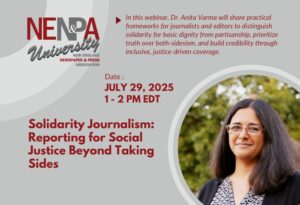The back-to-school season is one of the most valuable times of year for engaging readers and attracting advertisers — if you have the right strategy. In this free Local Media Association webinar, we’ll explore how to create high-performing content packages, newsletters, and social media campaigns that resonate with parents, students, and educators. You’ll also learn how to position your content for sponsorship, develop school-focused advertiser partnerships, and use data to drive results.
Presenter: David Arkin, Founder, David Arkin Consulting
With the need for privacy and secure communications increasing, more journalists are turning to the Signal app while newsgathering. The app uses end-to-end encryption for its services that prevents third-parties from viewing the content shared. Join us for an introductory lesson on how to use the app to protect sources, documents and other materials—presented free by the New England First Amendment Coalition.
About Your Instructors
Davis Erin Anderson is a senior digital security trainer at Freedom of the Press Foundation. She has reached thousands of journalists through her fun and impactful training sessions, as well as her contributions to FPF’s security blog. Anderson joined FPF in 2023 with expertise in creating and delivering engaging content on digital security; past projects include NYC Digital Safety, Data Privacy Project, and Web Literacy for Library Staff. She holds degrees in library science and music performance, and she performs regularly as a French horn player with orchestras and other ensembles in and around NYC.
Abigail Lis-Perlis (they/them) is the Program Manager for the digital security training team at Freedom of the Press Foundation (FPF), where they steward client services and program development. They have been with FPF since 2021, supporting journalists, media makers and human rights workers to keep themselves and their sources safe. They have an eclectic professional background, including experience in curriculum development, content production, project management, grassroots fundraising, facilitation, and communications, as well as a rich history as an artist, educator, and community organizer. Lis-Perlis is the founder and artistic director of folkLAB, a Pittsburgh, PA based arts collaborative.
Join us for a complimentary session presented by Local Media Association and Local Media Consortium.
In this session, you’ll discover how to collect, analyze, and activate your own data to create high-value audience segments that drive engagement, loyalty, and revenue. Join industry consultants from a leading professional services firm as they break down actionable frameworks for audience segmentation, real-world case studies, and proven techniques to maximize first-party data assets. Whether you’re a publisher, broadcaster, or digital media executive, you’ll walk away with practical ideas you can implement immediately to fuel audience growth and boost your bottom line. Don’t miss this opportunity to build a stronger, smarter, more sustainable data strategy — reserve your spot today!
For this free Indiegraf session, we’ll be joined by Dan Oshinsky, the former Director of Newsletters at BuzzFeed and The New Yorker, and now the founder of Inbox Collective, a consultancy that helps publishers grow their audiences and revenue through email.
Dan will dig into a key challenge for news publishers and content creators: turning newsletter readers into paying supporters—and keeping them engaged for the long haul.
Building a paid audience goes far beyond simply securing that first payment. To create lasting support, you need a strategy that works at every stage of the journey.
In this session, Dan will guide you through practical, actionable tactics to help you:
✅ Convert — Discover smart strategies that motivate your readers to become paying supporters.
✅ Retain — Learn how to keep those supporters engaged.
✅ Prevent churn — Recognize early signs when supporters start to drift away and how to bring them back before you lose them.
There’ll also be time for a live Q&A, so bring your questions!
As the National Press Club Journalism Institute’s inaugural Public Health Reporting Fellowship comes to a close, the five journalists who participated will share details from their ambitious reporting projects, including lessons learned, key findings, and their tips for practicing this type of journalism.
The cohort will have completed investigations into the growing disparities and solutions in disease prevention and health care for immigrant workers, rural populations, and elder communities, among other topics. This will be a celebration of their hard work and dedication over the past six months!
This program is part of the Institute’s inaugural Public Health Reporting Fellowship, funded by the Common Health Coalition. It’s being opened to the public at no cost.

What does it mean for journalism to truly stand with the communities it serves? Join NENPA University and Dr. Anita Varma, a leading voice in ethical journalism and faculty member at the University of Texas at Austin, for a thought-provoking session on Solidarity Journalism — an approach that prioritizes the lived experiences of marginalized communities in the service of basic dignity.
In this webinar, Dr. Varma will share practical frameworks for journalists and editors to distinguish solidarity for basic dignity from partisanship, prioritize truth over both-sidesism, and build credibility through inclusive, justice-driven coverage. Learn how solidarity journalism can strengthen journalism’s pursuit of truth, deepen audience connection, and uphold the core mission of journalism to serve the public in an era of growing polarization and disinformation.
Perfect for reporters, editors, and newsroom leaders committed to meaningful community engagement and more equitable journalism.
